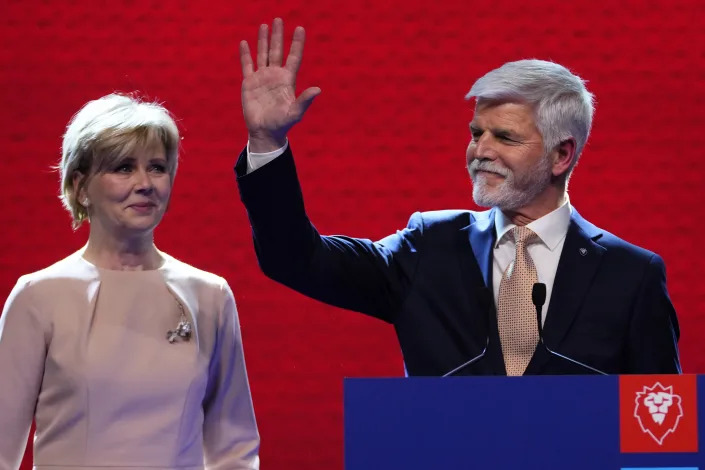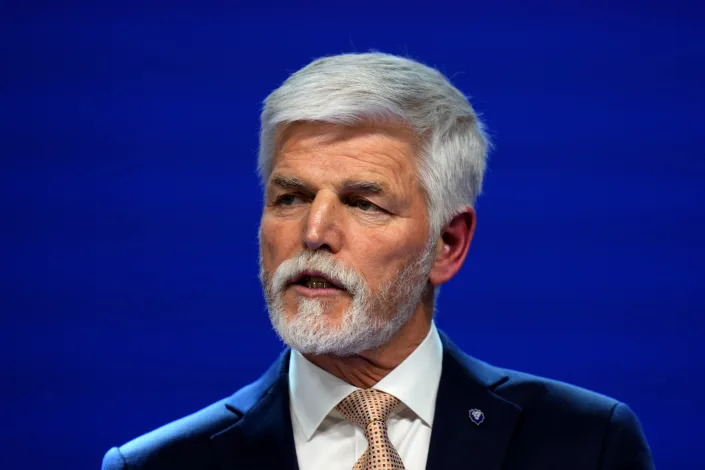Jan FLEMR
Sat, January 28, 2023

Retired general Petr Pavel, who won the Czech presidential election on Saturday, is a war hero with a passion for motorcycles.
Pavel beat billionaire former prime minister Andrej Babis to become the Czech Republic's fourth president since independence in 1993.
True to his military past, the 61-year-old has vowed to "restore order" in the EU and NATO member of 10.5 million people if elected.
"I can't ignore the fact that people here increasingly feel chaos, disorder and uncertainty. That the state has somehow ceased to function," Pavel said on his campaign website.
"We need to change this. We need to play by the rules, which will be valid for everyone alike. We need a general sweep," he added.
Sporting a carefully trimmed beard and white hair, Pavel rarely smiled during the campaign, but that did not deter voters.
"His indisputable advantage is that he looks very charismatic and representative, even when he's just standing and saying nothing," independent political analyst Jan Kubacek told AFP.
- Communist 'mistake' -
Born on November 1, 1961, Pavel attended both a military grammar school and a military university in the former Czechoslovakia, which was then ruled by Moscow-backed communists.
He joined the Communist Party and began a rapid rise through army ranks.
His critics fault him for having studied to become a military intelligence agent for the communist army.
"I was born into a family where party membership was considered normal," Pavel said on his website.
"I didn't have enough information and experience to assess the criminal nature of the regime. Now I know it was a mistake."
When communism fell in 1989, Pavel cast aside his party ID but went ahead with the intelligence course.
An elite paratrooper, Pavel won recognition when he helped free French troops from a Serbo-Croatian war zone in early 1993.
- 'Grandpa' -
After the Czech Republic joined NATO in 1999, Pavel spent three years at the alliance's regional command in the Netherlands.
He later earned a master's degree in international relations at King's College in London before going on to work as the Czech army's chief of staff.
In 2015, he was appointed the head of the NATO Military Committee, its top military official.
With a chest full of decorations -- including the US Legion of Merit and France's Croix de Guerre for bravery -- Pavel retired from the army in 2018.
When the Covid pandemic struck, Pavel founded the "Stronger Together" initiative to help tackle various crises and assist those in need.
Pavel's wife Eva is also a soldier. He has two sons from a previous marriage, plus a stepdaughter, and describes himself as a "grandpa enjoying his grandchildren".
Pavel claims to enjoy travel, skiing, photography and reading during his spare time, but his true passion is motorcycling.
Having switched from a Suzuki off-road bike, he now has a dual-sport BMW.
"For 33 years, I have served the democratic and pro-western drive of our country," Pavel said on his website.
"I believe my deeds show clearly the values I stand for and that I am willing to fight hard to preserve them."
Retired Czech army general Pavel wins presidential election


Czech Republic Presidential ElectionCzech Republic's President elect Petr Pavel with his wife Eva greets his supporters after announcement of the preliminary results of the presidential runoff in Prague, Czech Republic, Saturday, Jan. 28, 2023.
(AP Photo/Petr David Josek)
KAREL JANICEK
Sat, January 28, 2023
PRAGUE (AP) — Petr Pavel, a retired army general, defeated populist billionaire Andrej Babis in a runoff vote Saturday to become the new Czech president.
Pavel, 61, will succeed controversy-courting Milos Zeman in the largely ceremonial but prestigious post. With the ballots from 99.5% of polling stations counted by the Czech Statistics Office, Pavel had 58.2% of the vote compared with 42.8% for Babis.
“We can have different views of a number of issues, but that doesn’t mean we’re enemies,” Pavel said in a message to voters who cast ballots for Babis after what was considered a nasty presidential campaign period. “We have to learn how to communicate with each other.”
Babis conceded defeat and congratulated Pavel on his victory. He called on his supporters “to accept that I’ve lost and accept we have a new president.”
Pavel, who ran as an independent, is a former chairman of NATO’s military committee, the alliance’s highest military body. He fully endorsed the Czech Republic's military and humanitarian support for Ukraine in its fight against Russia's invasion and stresses the importance of the country's membership in the European Union and NATO.
The president picks the prime minister after a general election, one of the office’s key responsibilities, and appoints members of the central bank. The office-holder also selects Constitutional Court judges with the approval of Parliament’s upper house.
Otherwise, the president has little executive power since Czechia is run by a government chosen and led by the prime minister.
Losing the race to Pavel was another major defeat for Babis 68, a former prime minister. His centrist ANO (YES) movement ended up in opposition after losing the 2021 general election.
Zeman, the outgoing president, had backed Babis, one of country’s richest people. The two men share euroskeptic views and the habit of using anti-migrant rhetoric.
While Babis has been a divisive figure, he maintained his popular support with older voters. He accused Pavel, during a campaign marred by false accusations, of having been a KGB-trained communist spy. He provided no evidence for the claim, and went on to compare his opponent to Russian President Vladimir Putin.
The Ukraine war was a core campaign issue. Babis presented himself as a peacemaker and labeled Pavel a warmonger due to his military past.
In his most controversial statement, Babis said he wouldn’t send troops to Poland or the Baltics if the NATO allies were attacked. He later backtracked.
Zeman, who took office in March 2013, was the country's first president elected by popular vote. His second and final five-year term expires in March. Lawmakers elected the previous two presidents, Vaclav Havel and Vaclav Klaus.
Before the February 2022 invasion of Ukraine, Zeman divided the nation with his pro-Russia stance and support for closer ties with China.
KAREL JANICEK
Sat, January 28, 2023
PRAGUE (AP) — Petr Pavel, a retired army general, defeated populist billionaire Andrej Babis in a runoff vote Saturday to become the new Czech president.
Pavel, 61, will succeed controversy-courting Milos Zeman in the largely ceremonial but prestigious post. With the ballots from 99.5% of polling stations counted by the Czech Statistics Office, Pavel had 58.2% of the vote compared with 42.8% for Babis.
“We can have different views of a number of issues, but that doesn’t mean we’re enemies,” Pavel said in a message to voters who cast ballots for Babis after what was considered a nasty presidential campaign period. “We have to learn how to communicate with each other.”
Babis conceded defeat and congratulated Pavel on his victory. He called on his supporters “to accept that I’ve lost and accept we have a new president.”
Pavel, who ran as an independent, is a former chairman of NATO’s military committee, the alliance’s highest military body. He fully endorsed the Czech Republic's military and humanitarian support for Ukraine in its fight against Russia's invasion and stresses the importance of the country's membership in the European Union and NATO.
The president picks the prime minister after a general election, one of the office’s key responsibilities, and appoints members of the central bank. The office-holder also selects Constitutional Court judges with the approval of Parliament’s upper house.
Otherwise, the president has little executive power since Czechia is run by a government chosen and led by the prime minister.
Losing the race to Pavel was another major defeat for Babis 68, a former prime minister. His centrist ANO (YES) movement ended up in opposition after losing the 2021 general election.
Zeman, the outgoing president, had backed Babis, one of country’s richest people. The two men share euroskeptic views and the habit of using anti-migrant rhetoric.
While Babis has been a divisive figure, he maintained his popular support with older voters. He accused Pavel, during a campaign marred by false accusations, of having been a KGB-trained communist spy. He provided no evidence for the claim, and went on to compare his opponent to Russian President Vladimir Putin.
The Ukraine war was a core campaign issue. Babis presented himself as a peacemaker and labeled Pavel a warmonger due to his military past.
In his most controversial statement, Babis said he wouldn’t send troops to Poland or the Baltics if the NATO allies were attacked. He later backtracked.
Zeman, who took office in March 2013, was the country's first president elected by popular vote. His second and final five-year term expires in March. Lawmakers elected the previous two presidents, Vaclav Havel and Vaclav Klaus.
Before the February 2022 invasion of Ukraine, Zeman divided the nation with his pro-Russia stance and support for closer ties with China.
No comments:
Post a Comment